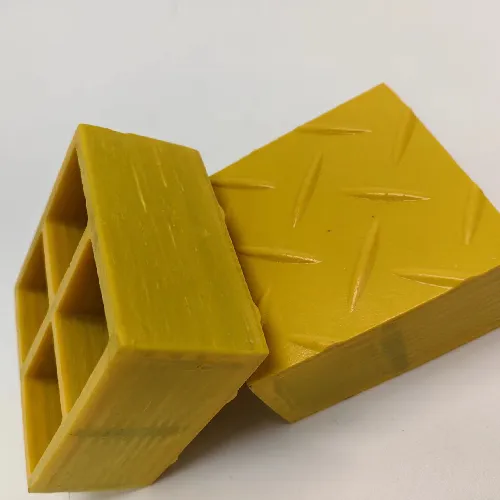loading...
- No. 9, Xingyuan South Street, Dongwaihuan Road, Zaoqiang County, Hengshui, Hebei, China
- admin@zjcomposites.com
- +86 15097380338
- Welcome to visit our website!
frp filter vessel
Understanding FRP Filter Vessels A Comprehensive Overview
FRP filter vessels, or Fiber Reinforced Plastic filter vessels, represent a crucial component in modern water treatment and filtration systems. These vessels have gained significant popularity due to their lightweight, corrosion-resistant, and cost-effective nature, making them an ideal choice for various industrial applications. In this article, we will delve into the characteristics, advantages, and applications of FRP filter vessels, highlighting their importance in ensuring clean water access for various sectors.
What Are FRP Filter Vessels?
FRP filter vessels are specialized vessels designed for the filtration process in water treatment systems. Constructed from a polymer matrix reinforced with fibers, typically glass fibers, these vessels exhibit exceptional strength-to-weight ratios and can withstand significant internal pressure. The primary function of FRP filter vessels is to house filtration media, such as activated carbon, sand, or other substances, which aid in the removal of contaminants from water.
Key Characteristics of FRP Filter Vessels
1. Corrosion Resistance One of the standout features of FRP filter vessels is their resistance to corrosion. Traditional materials like steel often succumb to rust and chemical reactions, especially in harsh water environments. In contrast, FRP materials are impervious to most corrosive substances, making them ideal for chemical processing and wastewater treatment applications.
2. Lightweight FRP vessels are significantly lighter than their steel or concrete counterparts. This property not only simplifies installation and transportation but also reduces the structural load on existing infrastructures, allowing for more flexible design options in treatment facilities.
3. Customization FRP filter vessels can be molded into various shapes and sizes, allowing for customization to meet specific project requirements. Manufacturers can tailor these vessels based on the desired filtration media and application environment, enhancing operational efficiency.
4. Thermal Insulation Due to their composition, FRP vessels have excellent thermal insulation properties. This feature is particularly beneficial in applications where temperature control is crucial, helping to maintain optimal conditions for the filtration process.
Advantages of FRP Filter Vessels
The adoption of FRP filter vessels offers several advantages over traditional metal or concrete filters
1. Cost Efficiency While the initial investment for FRP vessels may be higher in some cases, their longevity and minimal maintenance requirements often lead to lower overall costs. The resistance to corrosion means that replacement and repair costs are significantly reduced.
frp filter vessel

2. Durability FRP vessels have a long operational life, often exceeding that of traditional filter vessels. This durability is especially valuable in industries where constant uptime and reliability are essential.
3. Sustainability Given their long life span and recyclability, FRP vessels contribute to more sustainable practices in water treatment. Their inherent properties reduce the need for frequent replacements and repairs, thus lowering resource consumption over time.
4. Enhanced Performance The ability to customize FRP vessels allows for improved filter performance. Tailored designs enable optimal flow rates, enhancing filtration efficiency and reducing energy consumption during the treatment process.
Applications of FRP Filter Vessels
FRP filter vessels find applications across various sectors, including
- Water Treatment Plants Essential in municipal water treatment, these vessels filter and purify drinking water, ensuring compliance with health regulations.
- Industrial Processes Many industries rely on FRP vessels for chemical processing, pharmaceutical manufacturing, and food processing, where water quality is critical.
- Wastewater Treatment FRP vessels are utilized in the treatment of industrial and municipal wastewater, aiding in the removal of pollutants and contaminants.
- Aquaculture In fish farming, FRP vessels are employed to maintain water quality and ensure the health of aquatic life.
Conclusion
In summary, FRP filter vessels are a vital innovation in the realm of water treatment and filtration systems. Their unique combination of strength, durability, and resistance to corrosion makes them an ideal solution for various applications across multiple industries. As the demand for clean and safe water continues to rise, the role of FRP filter vessels will undoubtedly become increasingly significant in meeting these challenges, contributing to a more sustainable future for water resources globally. Whether in municipal treatment facilities or industrial applications, FRP filter vessels stand out as a reliable choice for effective water filtration.
-
GRP Structures: The Future of Lightweight, High-Performance EngineeringNewsJun.20,2025
-
FRP Water Tank: High-Performance Storage for Corrosive and Clean Water SystemsNewsJun.20,2025
-
FRP Square Tube: The New Industry Standard for Chemical and Structural ApplicationsNewsJun.20,2025
-
FRP Pultruded Profiles: The Ultimate Choice for Lightweight Structural StrengthNewsJun.20,2025
-
FRP Handrails: The Safer, Smarter, and Stronger Choice for Modern InfrastructureNewsJun.20,2025
-
FRP Grating: The Smart Solution for Durable, Lightweight Industrial FlooringNewsJun.20,2025
-
Why Choose a Galvanized Water Tank for Your Storage NeedsNewsMay.21,2025
